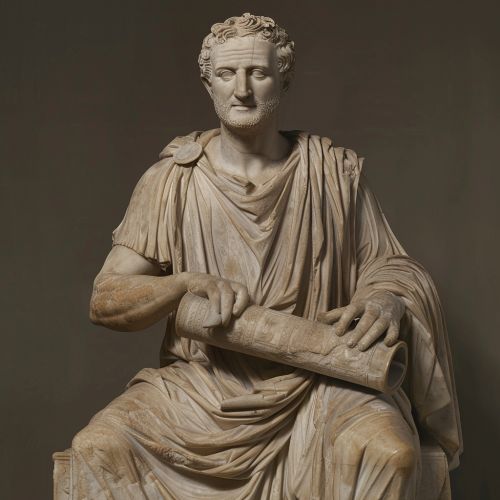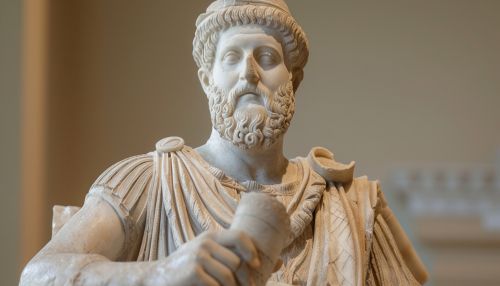Menander
Early Life and Background
Menander (c. 342/341 – c. 290 BCE) was a prominent playwright of ancient Greece, specifically of the New Comedy period. Born in Athens, Menander was the son of Diopeithes, a well-known general. His family was affluent and well-connected, which provided Menander with the opportunity to receive a comprehensive education. He studied under the philosopher Theophrastus, a student of Aristotle, which significantly influenced his intellectual development and literary style.
Career and Works
Menander's career as a playwright began in the late 4th century BCE, during a period marked by significant political and social changes in Athens. He is credited with writing over 100 plays, though only one complete play, "Dyskolos" (The Grouch), has survived to the present day. The rest of his works are known only through fragments and references in the writings of later authors.
Menander's plays are characterized by their sophisticated plots, well-developed characters, and keen observations of contemporary Athenian society. Unlike the Old Comedy of Aristophanes, which was heavily satirical and political, Menander's New Comedy focused on domestic situations, romantic entanglements, and social issues. His works often featured stock characters such as the cunning slave, the braggart soldier, and the miserly old man, which would later influence Roman playwrights like Plautus and Terence.
Literary Style and Themes
Menander's writing style is noted for its elegance, wit, and subtlety. He employed a refined Attic Greek, which was accessible to the educated elite of his time. His plays often explored themes such as love, marriage, family dynamics, and the complexities of human relationships. Menander's characters were more realistic and relatable compared to the exaggerated figures of Old Comedy, making his works resonate with a broader audience.
One of Menander's significant contributions to the development of comedy was his use of the "recognition scene" (anagnorisis), where characters discover their true identities or relationships, leading to a resolution of the plot. This narrative device became a staple in later comedic and dramatic literature.
Influence and Legacy
Menander's influence on subsequent generations of playwrights and the broader literary tradition cannot be overstated. His works were highly regarded in antiquity, and he was often quoted by other authors. The Roman playwrights Plautus and Terence adapted many of Menander's plays, incorporating his plots and characters into their own works. This helped to preserve Menander's legacy and ensured that his influence extended well beyond the Hellenistic period.
Despite the loss of most of his plays, Menander's impact on the development of Western comedy is evident. His emphasis on character development, realistic dialogue, and intricate plotting set a new standard for comedic writing. Menander's works also provided valuable insights into the social and cultural life of Athens during the Hellenistic era.


Rediscovery and Modern Reception
The rediscovery of Menander's works began in the late 19th and early 20th centuries, with the unearthing of papyrus fragments in Egypt. These discoveries provided scholars with new material to study and appreciate Menander's contributions to literature. The most significant find was the nearly complete text of "Dyskolos," discovered in 1957.
Modern scholars have continued to explore Menander's works, analyzing his use of language, themes, and dramatic techniques. His plays are now recognized as important cultural artifacts that offer a window into the everyday life and social norms of ancient Athens. Menander's influence on later European literature, particularly during the Renaissance, further underscores his enduring legacy.
